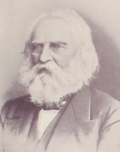Mad River
by Henry Wadsworth Longfellow
In The White Mountains.
TRAVELLER
Why dost thou wildly rush and roar,
Mad River, O mad River?
Wilt thou not pause and cease to pour
Thy hurrying, headlong waters o'er
This rocky shelf for ever?
What secret trouble stirs thy breast?
Why all this fret and flurry?
Dost thou not know that what is best
In this too restless world is rest
From over-work and worry?
THE RIVER
What wouldst thou in these mountains seek,
O stranger from the city?
Is it perhaps some foolish freak
Of thine, to put the words I speak
Into a plaintive ditty?
TRAVELLER
Yes; I would learn of thee thy song,
With all its flowing numbers,
And in a voice as fresh and strong
As thine is, sing it all day long
And hear it in my slumbers.
THE RIVER
A brooklet nameless and unknown
Was I at first, resembling
A little child, that all alone
Comes venturing down the stairs of stone
Irresolute and trembling.
Later, by wayward fancies led,
For the wide world I panted;
Out of the forest dark and dread,
Across the open fields, I fled
Like one pursued and haunted.
I tossed my arms, I sang aloud,
My voice exultant blending
With thunder from the passing cloud;
The wind, the forest bent and bowed,
The rush of rain descending.
I heard the distant ocean call,
Imploring and entreating;
Drawn onward, o'er this rocky wall
I plunged, and the loud waterfall
Made answer to the greeting.
And now, beset with many ills,
A toilsome life I follow;
Compelled to carry from the hills
These logs to the impatient mills
Below there in the hollow.
Yet something ever cheers and charms
The rudeness of my labours;
Daily I water with these arms
The cattle of a hundred farms,
And have the birds for neighbours.
Men call me Mad, and well they may,
When, full of rage and trouble,
I burst my banks of sand and clay,
And sweep their wooden bridge away
Like withered reeds and stubble.
Now go and write thy little rhyme
As of thine own creating.
Thou seest the day is past its prime,
I can no longer waste my time,
The mills are tired of waiting.
Notes to the poem:
This was the last poem published during the poet's lifetime; he corrected the proof only two or three days before his death.
Source:
Longfellow's Poetical WorksCopyright 1893
Henry Frowde, London
